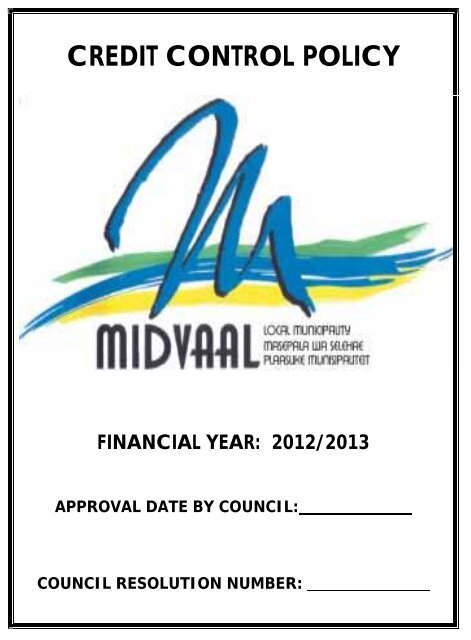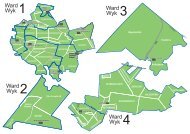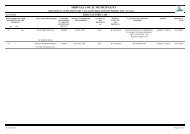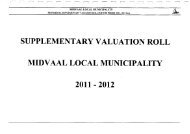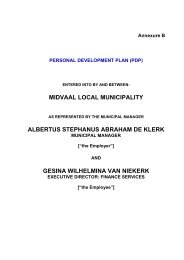CREDIT CONTROL POLICY - Midvaal Local Municipality
CREDIT CONTROL POLICY - Midvaal Local Municipality
CREDIT CONTROL POLICY - Midvaal Local Municipality
You also want an ePaper? Increase the reach of your titles
YUMPU automatically turns print PDFs into web optimized ePapers that Google loves.
<strong>CREDIT</strong> <strong>CONTROL</strong> <strong>POLICY</strong><br />
FINANCIAL YEAR: 2012/2013<br />
APPROVAL DATE BY COUNCIL:<br />
COUNCIL RESOLUTION NUMBER:
Contents<br />
INTRODUCTION .................................................................................................<br />
LEGISLATICE FRAMEWORK ............................................................................<br />
COUNCILLOR AND STAFF ARREARS .............................................................<br />
APPLICATION FOR RENDERING SERVICES ...................................................<br />
DISPUTES ...........................................................................................................<br />
IRRECORVERABLE DEBT .................................................................................<br />
GENERAL ...........................................................................................................<br />
RATES AND TAXES ...........................................................................................<br />
WATER AND ELECTRICITY ...............................................................................<br />
OTHER DEBT ......................................................................................................<br />
ARRANGEMENT TO PAY ARREARS ACCOUNT .............................................
Introduction<br />
The purpose of this document is to outline the revenue management principles to<br />
be adhered to in the <strong>Midvaal</strong> <strong>Local</strong> <strong>Municipality</strong>. The policy is aimed at ensuring<br />
that the following broad objectives are achieved:<br />
- The maximisation of revenue collection;<br />
- The preparation and collection of debtors’ accounts timeously.<br />
Legislative Framework<br />
Section 96 of <strong>Local</strong> Government Municipal Systems Act (Act 32 of 2000)<br />
stipulates that a municipality must:<br />
- Collect all money that is due and payable to it, subject to the act (Act 320<br />
of 2000) and any other applicable legislation and the Municipal Finance<br />
Management Act (56 of 2003)<br />
- Adopt, maintain and implement a credit control and debt collection policy<br />
which is consistent with its rates and tariff policies and complies with the<br />
provision of the <strong>Local</strong> Government Municipal Systems Act (Act 32 of<br />
2000)<br />
Councillor and staff arrears<br />
1. Staff Accounts:<br />
Staff arrears will be dealt with in accordance with Schedule 2 of the<br />
Systems Act, and in terms of any procedures, method or action referred to<br />
in this Policy. Notwithstanding any other procedure, method or action that
may be taken in terms of this Policy, the municipality will deduct any<br />
outstanding amount from such staff members’ 3 (three) month period.<br />
2. Councillor accounts:<br />
In accordance with Schedule 1, item 12A of the Systems Act, a Councillor<br />
of the <strong>Municipality</strong> may not be more than 3 (three) months in arrears for<br />
municipal service fees, surcharges on fees, property rates or any other<br />
municipal taxes, levies and duties levied by the municipality.<br />
Notwithstanding any other procedure, method or action that may be taken<br />
in terms of this Policy, the municipality will deduct any outstanding amount<br />
from such councillors’ 3 (three) month period.<br />
Application for rendering services<br />
1. NO new applications will be allowed on a tenant’s name.<br />
2. All new applications for the provision of a service will be subject to the<br />
payment of a deposit based on the deposit detailed in the tariff policy.<br />
3. The deposit determined by the municipality must be paid in full before<br />
services can be provided.<br />
4. The deposit must be paid in cash or by bank guarantee<br />
5. The <strong>Municipality</strong> shall not conduct any business activity with or provide any<br />
services to any persons who are in arrears with municipal accounts except as<br />
provided for in this policy and as determined by the <strong>Municipality</strong> from time to<br />
time, nor will any refunds of credits be made to any debtor who is in arrears<br />
with their municipal account. The credit amount will be utilized against any<br />
other arrears account.
6. Current tenant accounts:<br />
- If the tenant account is in arrears, after the final account has<br />
been issued, the outstanding amount will be transferred to<br />
the owners account.<br />
- Duplicate tenant statement can be issued on request by the<br />
owner<br />
- A letter will be issued to the owner notifying the owner of the<br />
outstanding debt of the tenant.<br />
Disputes<br />
1. In this policy “dispute” refers to the instance when a debtor questions the<br />
correctness of any account rendered by the <strong>Municipality</strong> with the Municipal<br />
Manager as per the process in sub-item (2) below.<br />
2. In order for a dispute to be registered with the municipality, the following<br />
procedures must be followed:<br />
By the debtor<br />
a) The dispute must be submitted in writing<br />
b) No dispute will be registered verbally whether in person or over the<br />
telephone.<br />
c) The debtor must furnish full personal particulars including ALL<br />
account numbers held with the <strong>Municipality</strong>, direct contact<br />
telephone number, fax-number, postal and e-mail addresses and<br />
any other relevant particulars required by the municipality.<br />
d) The full nature of the dispute must be described in the<br />
correspondence referred to above.<br />
e) The onus will be on the debtor to ensure that he receives a written<br />
acknowledgement of the dispute.<br />
f) The debtor will be liable for the amount due except for the dispute<br />
amount on or before due date for the account rendered.<br />
By the <strong>Municipality</strong>:<br />
a) On receipt of the dispute the following actions are to be taken:<br />
- A written acknowledgement of the receipt of the dispute must<br />
be provided to the debtor.<br />
- The amount payable by the debtor for the specific month of the<br />
dispute and inform the debtor that all accounts thereafter must<br />
be paid in full.<br />
- Specify the time to resolve the dispute- disputes must be solved<br />
within 3 (three) months
- The dispute must be registered in a dispute register<br />
- Inform the Debtors Department and the Debt Collection<br />
Department of the dispute<br />
- Ensure that all relevant information received is rectified<br />
accordingly on the finance system<br />
- Conduct checks or follow-ups on all disputes as unresolved<br />
3. The following provisions apply to the consideration of disputes:<br />
a) All disputes must be concluded by the Municipal Manager or<br />
delegated official<br />
b) The Municipal Manager’s or the delegated official’s decision is final<br />
and will result in the immediate implementation of any debt<br />
collection and credit control measures provided for in this Policy<br />
after the debtor is provided with the outcome of the appeal.<br />
c) The same debt will not again be defined as a dispute in terms of<br />
this paragraph and will not be reconsidered as the subject of a<br />
dispute.<br />
d) Should the debtor not be satisfied with the outcome of the dispute,<br />
a debtor may lodge an appeal in terms of section 62 of the Systems<br />
Act.<br />
4. The <strong>Municipality</strong> reserves the right to declare a dispute on any account as<br />
may be deemed necessary.<br />
Irrecoverable debt<br />
Criteria for irrecoverable debt<br />
Debt will only be considered as irrecoverable if it complies with the following<br />
criteria:<br />
a) The cost to recover the debt does not warrant further action: or
Authorisation<br />
b) A deceased estate has no liquid assets to cover the outstanding<br />
amount following the final distribution of the estate; or<br />
c) It has been proven that the debt has prescribed; or<br />
d) Any amount equal to or less than R1 000.00 (one thousand) will be<br />
considered too small, after having followed basic checks, to warrant<br />
further endeavours to collect it; or<br />
e) The outstanding amount is due to an irrecoverable administrative<br />
error by the municipality; or<br />
f) A court has ruled that the claim is not recoverable<br />
g) All debtors who are registered as indigent<br />
As rates are deemed to be recoverable in all instances, all requests to write-off<br />
debt in respect of rates must be presented as individual items to the Council to<br />
authorise such debt to be written off, exclude indigent approvals.<br />
In respect of other debt, schedule indicating the debtor account number, the<br />
debtor’s name, amount per account category as well as a reason to write-off the<br />
amount must be complied.<br />
Notwithstanding the above, Council will be under no obligation to write-off any<br />
particular debt and will always retain sole discretion to do so.<br />
General<br />
Interest will be charged on all overdue accounts.<br />
Rates and taxes<br />
When an account has not been paid after 60 days the following procedures<br />
apply:
a) The data per each debtor is extracted per ward and a final notice is sent<br />
out via the post.<br />
b) The amount due must be paid within 21 days.<br />
c) If a debtor cannot make a payment, they can make an arrangement to<br />
pay. All arrangements must be recorded on the system.<br />
d) A debt rescheduling arrangement requires an initial payment of 50% of the<br />
outstanding account, where after the current account plus an acceptable<br />
but affordable amount towards the arrears each month. An arrangement<br />
may, subject to all conditions in terms of the policy being adhered to, be<br />
entered into to suspend the debt collection process/legal action.<br />
e) The Ward Councillor will be informed of defaulting debtors following the<br />
issuing of the statutory notice/judgement order for the occupant.<br />
f) If no payment or arrangement is made within 21 days, the same data is<br />
captured and transferred to a handover account. The arrears will then<br />
reflect on this account and the normal monthly accounts will reflect in the<br />
current account.<br />
g) All arrears are handed over to lawyers and summonses will then be issued<br />
from the lawyers’ offices.<br />
h) The lawyers will proceed with judgement and then sale in execution if<br />
timeous feedback is not received from the debtor. In doing so Council will<br />
notify the ward councillor of the action taken.<br />
i) The debtor is responsible for all legal costs and will have to pay such costs<br />
before any legal action may be stopped. An acceptable and enforceable<br />
debt rescheduling agreement must also be entered with Council’s<br />
Attorneys before any legal action may be stopped.
Water and electricity<br />
a) Final notices are hand- delivered at the gate of the default debtor by a<br />
private firm, and the notices state that payment must be received within 7<br />
days.<br />
b) If the amount on the notice is not paid within the specified 7 days, the<br />
electricity will be disconnected and the water flow will be reduced, or<br />
disconnected in certain cases.<br />
c) If the amount is not paid on or before due-date, the electricity will be<br />
disconnected and the water flow will be reduced, or disconnected in<br />
certain cases.<br />
d) When disconnections of electricity and/or water takes place due to nonpayment,<br />
the consumer’s deposit will be adjusted if necessary.<br />
Other debt (Sundry Debt)<br />
In the recovery of sundry debt, Council reserves the right to utilise any legal<br />
action at its disposal.<br />
Restriction, disconnection and the termination of services may be utilised to<br />
obtain overdue payment.<br />
Arrangements to pay arrears accounts<br />
Debtors prepared to enter into arrears repayment arrangements must at least<br />
pay half of the arrears or as determent by the Chief Financial Officer and enter<br />
into an arrangement to pay the balance as follows:<br />
Arrangements to pay arrears amounts are to be made in terms of the following<br />
guidelines. For any arrangement that falls outside of the guidelines, the approval
of the Head of Revenue must be sought. The affixing of the signature of the Head<br />
of Revenue to the arrangement contract must evidence such approval.<br />
Debtors entering into arrangements must in addition, pay the current accounts<br />
due or they will be considered to be in default of the arrangement.<br />
Amount outstanding Initial payment Maximum<br />
period<br />
payment<br />
Less than R2 000 OR<br />
less than six months<br />
More than R2 000 and<br />
less than R5 000 OR<br />
greater than six months<br />
but less than 12 months<br />
Greater than R5 000 OR<br />
greater than 12 months<br />
½ of outstanding balance 3 months<br />
½ of outstanding balance 6 months<br />
½ of outstanding balance 12 months but may differ<br />
with particularly large and<br />
old amounts, e.g. 3<br />
years. The CFO and<br />
senior management may<br />
use discretion to decide<br />
on such accounts.<br />
Merit cases will be allowed, where special circumstances prevail, and must be<br />
treated individually and could amongst others include the following categories :<br />
- Unemployed persons.<br />
- Deceased estates.<br />
- Liquidated companies or CC’s.<br />
- Private persons under administration.
- Outstanding enquiries on accounts, for example, misallocated payments, water<br />
leaks, journals, incorrect levies, etc.<br />
- Pensioners.<br />
- Any other cases not mentioned which can be regarded as merit cases due to<br />
circumstances.<br />
Extension for payment of arrears in respect of merit cases should not exceed 5<br />
years in the case of property owners and 6 months in the case of tenants with the<br />
first payment within 30 days of the date of the agreement.<br />
Written confirmation of all arrangements will be obtained. Such confirmation will<br />
be on the standard form designed for this purpose and will list:<br />
The debtors details;<br />
The initial payment;<br />
The monthly amount to be paid and the length of the arrangement;<br />
Action to be taken if the debtor defaults against the arrangement;<br />
Arrangements to pay must be entered onto the debtors system to prevent<br />
further expense being incurred in additional, unnecessary follow-up action.


